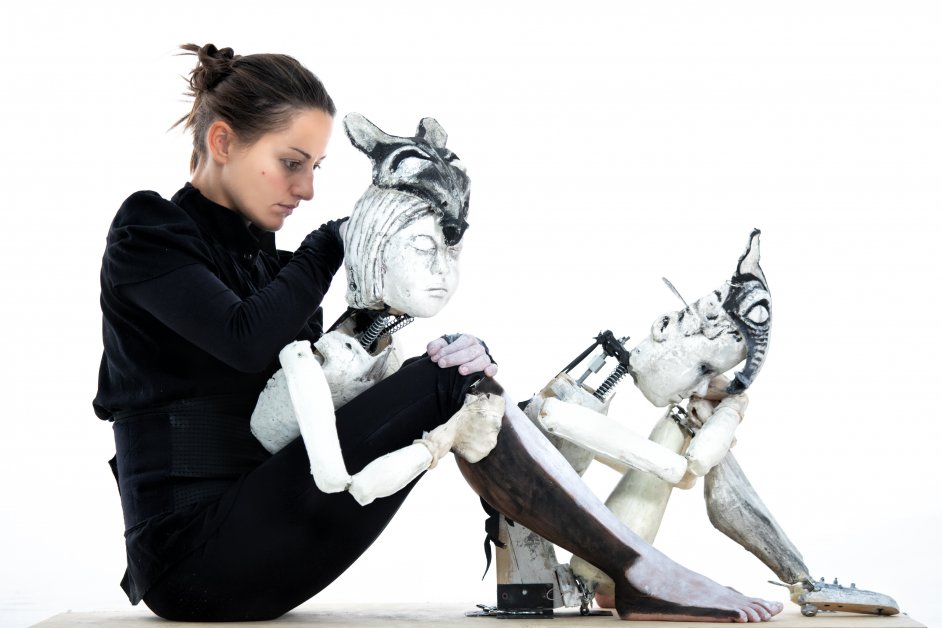The song of the fall
Marta Cuscunà
CREDITSby and with Marta Cuscunà
assistant director Marco Rogante
videomaker Andrea Pizzalis
lighting design Claudio “Poldo” Parrino
metal constructions Righi Franco Srl
vocal score Francesca Della Monica
in collaboration with Teatro Stabile di Bolzano, A Tarumba Teatro de Marionetas | Lisbon
technical sponsor igus® innovazione con i tecnopolimeri; Marta s.r.l. forniture per l'industria
Marta Cuscunà is part of the Fies Factory project by Centrale Fies
The realm of the Fanes
The myth of the Fanes is a popular tradition belonging to the Ladin people, a small ethnic minority (35,000 people) living in the central valleys of the Dolomites.
It is an epic cycle, but the contents are quite unusual and different from other Ladin myths. The myth of the Fanes speaks of the end of the peaceful reign of women and the beginning of a new era of domination and the sword.
It is a dark song of the collapse into the horror of war.
The central figure of the story is Dolasilla, princess of the Fanes, forced by her father (called "the false king"), to become a Tjeduya. This is a warrior, the armed hand of power.
It is this unfortunate choice of the false king, obsessed with the possession of wealth and power over the lands and neighbouring peoples, that causes the end of the matrilineal kingdom and its people.
The myth tells that the few survivors are still hidden in the bowels of the mountain together with their elderly queen, waiting for the golden age of rebirth to return. A golden time of peace when the people of the Fanes will finally be able to return to life.
Looking back to go forward
"When I started to think about the myth of the Fanes at the centre of my new theatrical piece, I immediately came up against one big question: what sense does it make to tell an ancient Ladin myth in the theatre nowadays? Who would really find it interesting?
The answers I found is rooted in Riane Eisler's anthropology essay: The Chalice and the Blade.
Riane Eisler investigated the social structures that humanity has set itself over the centuries during a continuous epic of wars and injustice. This thinking raises questions that are more important than ever: is war an indelible part of the destiny of humanity? What perpetually drives us to war instead of seeking peace? Why do we hunt and persecute each other? Is male brutality and domination over women inevitable? Is the transition from a system of incessant war and social injustice to a mutually peaceful system realistically possible?
According to the anthropologist Riane Eisler, the answers for a better future could be rooted in a point in prehistoric European civilization, also referred to by the Lithuanian archaeologist Marija Gimbutas, where our cultural evolution was literally overturned. The song of this fall, through the ancient myth of the Fanes, seeks to bring to light the lost account of how we were, a description of a desirable social alternative for the future of humanity, but one that is always presented as a utopia that is impossible to create.
But perhaps it already once existed ".
Marta Cuscunà
Images
Press reviews
Anna Bandettini, C'era una volta il popolo delle donne - la Repubblica-il venerdì, 16 novembre 2018 [640 Kb]Il canto della caduta, intervista espansa a Marta Cuscunà - altrevelocità, 3 aprile 2019 [198 Kb]Alessio Screm, Incanta e conquista il canto di Marta Cuscunà - Messaggero Veneto, 29 ottobre 2018 [452 Kb]Gianfranco Capitta, La gabbia meccanica del potere maschile - il manifesto, 27 ottobre 2018 [405 Kb]Alessia Pilotto, Miti femminili contro le guerre - Il Gazzettino, 27 ottobre 2018 [292 Kb]Doriana Legge, Nel mito, tra guerre e società matrilineari. Intervista a Marta Cuscunà - Teatro e critica.it, 26 ottobre 2018 [174 Kb]Alessia Pilotto, La pace 'uccisa' da un falso re - Il Gazzettino, 25 ottobre 2018 [368 Kb]Roberto Canziani, Marta Cuscunà e i corvi metallici l'animatronica in palcoscenico - Il Piccolo, 24 ottobre 2018 [1249 Kb]Mario Brandolin, Cuscunà e 'Il canto della caduta': le donne al governo nella pace - Messaggero Veneto, 24 ottobre 2018 [601 Kb]Stefano Damiani, Critica alla società patriarcale - La Vita Cattolica, 24 ottobre 2018 [899 Kb]Laura Zangarini, Uno stormo di corvi porta la guerra: le donne resistono / La Lettura - Corriere della Sera, 14 ottobre 2018 [1545 Kb]Tour
debut
25-26 October 2018
Teatro Contatto
Udine, Teatro Palamostre
tour
16-17 novembre 2018 h 21
Vicenza, Teatro Astra
23 November 2018
24 November 2018 matinée
San Marino, Teatro Titano
29 November 2018
Gorizia, Teatro Verdi
8, 11 January 2019 h 19.30
9, 10, 12 January 2019 h 21
13 January 2019 h 17
Trieste, Il Rossetti
17 January 2019 h 20.45
Sedegliano (UD), Teatro Plinio Clabassi
25 January 2019 h 20.45
Artegna (UD), Teatro Mons. Lavaroni
29 January 2019
Rubiera (RE), Teatro Herberia
15-16 February 2019 h 21
Lisbon, São Luiz Teatro Municipal
22 February 2019 h 21.30
Viseu, Teatro Viriato
27 February 2019 h 20.30
Gries (BZ), Teatro Comunale
12 March 2019 h 21
13 March 2019 matinée
Bologna, Arena del Sole, Sala Leo de Berardinis
19-24 March 2019
Turin, Teatro Gobetti
28 March 2019
Rassegna Materia Prima
Florence, Teatro Cantiere Florida
2 April 2019 matinée
Cesena (FC), Teatro Bonci
4 April 2019 h 21
Cervignano (UD), Teatro Pasolini
27 June 2019
Asti Teatro
Asti, Spazio Kor
8 August 2019, h 21
Operaestate Festival
Bassano del Grappa (VI), Teatro Remondini
10 September 2019, h 19
Short Theatre 2019
Rome, La Pelanda - Teatro 2
15-16 October 2019, h 20.30
Venice, Teatro Ca' Foscari
19 February 2022 h 19.30
20 February 2022 h 16
Milan, Piccolo Teatro Grassi
13 May 2023 h 18
14 May 2023 h 16
La Biennale Internationale des Arts de la Marionnette
Paris, Pantin, Salle Jacques Brel























